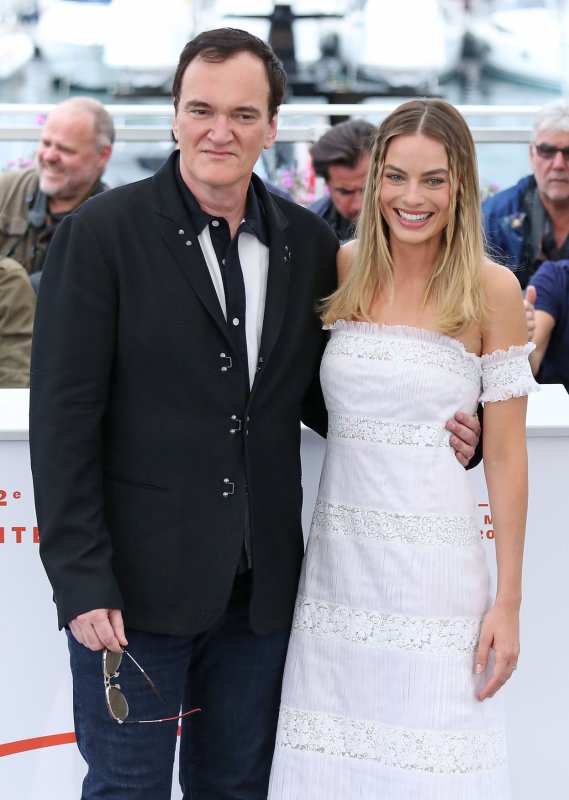Quentin Tarantino (L) and Margot Robbie arrive at a photocall for the film "Once Upon A Time In ... Hollywood" during the 72nd annual Cannes International Film Festival in Cannes, France, on May 22. File Photo by David Silpa/UPI |
License Photo
LOS ANGELES, Aug. 23 (UPI) -- Entering its fifth weekend at the box office, Quentin Tarantino's Once Upon a Time ... in Hollywood has to date garnered worldwide box office totals exceeding $180 million. That puts the film well on pace to be the director's highest domestic grosser ever.
Timed to coincide with the 50th anniversary of the 1969 Tate-LaBianca murders, Once depicts events that led up to the deaths of actress Sharon Tate and four others at the hands of Manson Family members Tex Watson, Susan Atkins and Patricia Krenwinkel.
An openly wistful love letter to 1960s Los Angeles, Once also seems to be a valentine to Tate, played by Margot Robbie.
"The whole movie is about saving Sharon," Tarantino said Sunday, speaking before an industry-only crowd at the Directors Guild of America. "But the minute you do that, you immediately know she's not saved. Part of the [impact of] the film, as you're watching it, is that you know she's going to die."
"That was the tricky part," Tarantino said. "Most of the audience members are familiar with the details of Sharon's murder. So that can act as a dramatic motor. You know this horrible shoe will drop, and every scene in the movie is taking you closer to that shoe."
In a unique departure for Tarantino, Once goes a step beyond historical fiction to what might be called "historical fantasy" -- creating a cinematic narrative combining actual historical figures Sharon Tate, Roman Polanski, Charles Manson and others alongside fictional characters of a distinctly Tarantino variety.
"When I was writing it, the first thing I had was the Cliff Booth character -- the stuntman character, played by Brad [Pitt]," Tarantino said. "And I knew he would be working as a stunt double for a 1950s or early '60s Western star actor, played by Leo [DiCaprio].
"So I had those two dudes, and I knew I was going to put them in a house right next door to Sharon Tate. Then, at that point, I knew I had my ending."
The director said his approach in crafting Once was inspired by a teenage fascination with E.L. Doctorow's Ragtime.
"I remember when I was 13, I got the hardback copy of Ragtime," Tarantino told UPI. "I remember reading it, and I remember thinking that I liked [Doctorow's] idea of picking a period and taking some real characters from that period, along with fictional characters, and then mixing them up. And I even remember thinking, 'Hey, maybe I'll do that someday.'"
That "someday," Tarantino said, came around 2008, following the release of his fifth film, Death Proof.
"I started writing it, little by little, sometime after Death Proof," he said. "So I've been working on it ever since. I began the process by writing the first few chapters in novel form. I normally like to write my scripts as if they're novels, but that was especially true of this one, because I was working on it for years and just kept putting it away."
By the time he completed the script, Tarantino said, he considered himself an expert on late '60s Hollywood, giving him unique command of the era's cultural minutiae.
"That knowledge allowed me to play it fast and loose," he said. "I would decide that certain details of the story had to be absolutely, positively, 100 percent the way they actually occurred on the day of the murders. And on some of the other stuff, I just said, 'I'm going to do what I want.'
"As far as viewers are concerned, they would probably feel that my choices as to which things I was precious about, and which things I was fast and loose about, were totally arbitrary. But to me, it was anything but arbitrary. It was completely personal."
Calling the film's ending "melancholy and sweet" -- adjectives rarely associated with Tarantino's work - the director said he considers Once to be "an intensely emotional experience" for viewers.
"The thing that's been so gratifying," Tarantino said, "is that I tried not to turn Sharon into a Quentin Tarantino character. I wanted her to be the person she was. She's just supposed to represent normalcy. She doesn't have any plot to advance.
"We're just sort of watching her live her life. Because that was what was robbed from her. The fact is that she's a person consigned to history to be defined, for the most part, by her tragic death.
"Now, as a result of people having watched Margot play Sharon, they can see that she was more than that. And I actually think people will think about her differently. In the end, I think this movie is about saving Sharon from her tombstone.
"To a small degree -- but to a significant degree -- I think this movie has actually done that."
Director and writer Quentin Tarantino (L) is joined by cast members, from left to right, Brad Pitt, Margot Robbie and Leonardo DiCaprio at the premiere. Pitt plays Cliff Booth, Robbie plays Sharon Tate and DiCaprio plays Rick Dalton in the film. Photo by Jim Ruymen/UPI |
License Photo
















